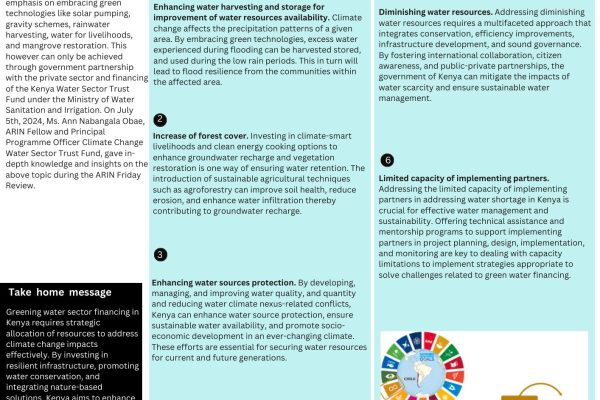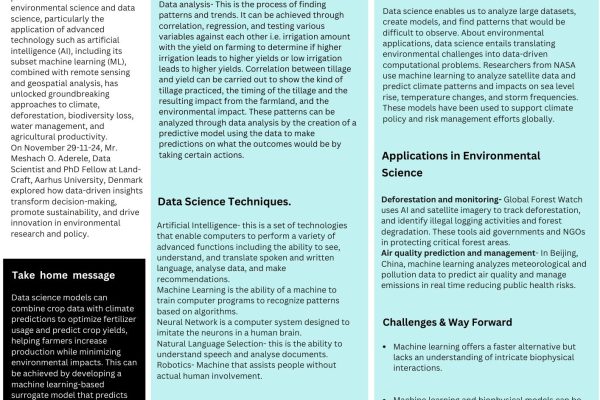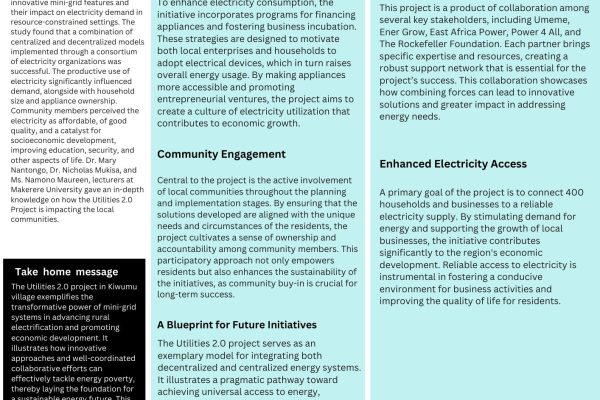Introduction
The intricate relationship between energy access and human health is crucial for sustainable development. However, policymakers often make decisions in this area without the necessary evidence-based foundation. Reliable access to clean energy sources can significantly reduce exposure to harmful pollutants, improve the functionality of medical facilities, and enhance overall quality of life. Conversely, dependence on traditional biomass fuels and inadequate energy infrastructure can lead to significant health risks, including respiratory illnesses, and unlimited access to modern healthcare. Our speaker, Amose Obonyo, lecturer at Masinde Muliro University of Science and Technology, and ARIN Fellow delved into these challenges within the context of leadership, financing structures, mechanisms, tools, and technical capacities that support Evidence-Informed Policy, particularly the energy-health nexus on September 27, 2024.
Key Messages.
Strengthening the Capacity of National Institutions
Enhancing the ability of national institutions to utilize evidence in the formulation of policies is paramount. This endeavour involves a multifaceted approach that includes comprehensive training sessions for policymakers and analysts in the principles of evidence-based decision-making. Furthermore, there is a need to establish dedicated research and data centers that can serve as hubs for collecting, analyzing, and disseminating critical information. Fostering partnerships between government bodies, academic institutions, and civil society organizations is also essential; such collaboration ensures a holistic approach to policymaking, where diverse perspectives are taken into account, leading to more informed and effective decisions.
Promoting Public Awareness and Education
Increasing public awareness of the intricate relationships between energy, health, and the environment is vital for generating support for policies that are grounded in evidence. Implementing targeted educational campaigns and community outreach initiatives can play a significant role in disseminating important information to the public. These programs not only raise awareness but also encourage community engagement, allowing individuals to participate actively in the policymaking process. By bridging the gap between policymakers and the community, these efforts can foster a more informed citizenry that advocates for sound policies.
Integrating Policy Frameworks
The integration of energy and health policies is crucial for developing well-rounded and effective solutions to interconnected challenges. For instance, promoting clean cooking technologies can significantly mitigate indoor air pollution, leading to improvements in respiratory health while simultaneously contributing to efforts in climate change mitigation. By ensuring that energy policies are closely aligned with health objectives, we can create synergistic outcomes that benefit both public health and environmental sustainability.
Ensuring Access to Reliable Data
Fundamental to the process of evidence-informed policymaking is the assurance of access to reliable and timely data. This encompasses the collection and thorough analysis of information relating to energy consumption patterns, health outcomes, and environmental consequences. Establishing data-sharing agreements and initiating open data programs are vital steps in facilitating this access. By doing so, researchers and policymakers can draw upon accurate data to guide their decisions, ensuring they are based on sound evidence.
Engaging Diverse Stakeholders
The involvement of a wide array of stakeholders—including community members, healthcare professionals, energy specialists, and policymakers—is essential for the creation of policies that are both comprehensive and inclusive. Engaging these groups not only enriches the policymaking process but also ensures that the policies developed reflect the realities and needs of all affected populations. By prioritizing stakeholder engagement, we can craft policies that are deeply rooted in community insights and realities, ultimately leading to more effective outcomes.
Conclusion
Enhancing evidence-informed policymaking regarding the interconnections between energy and human health in Kenya is critical for effectively addressing the complex challenges of energy access, environmental sustainability, and public health. By concentrating on these interconnected elements, Kenya can improve its policymaking processes, ultimately leading to more effective and sustainable solutions that resonate with the needs and aspirations of its citizens. Through a commitment to data-driven decision-making, stakeholder involvement, and integrated policy frameworks, the country can pave the way for a healthier and more sustainable future.




